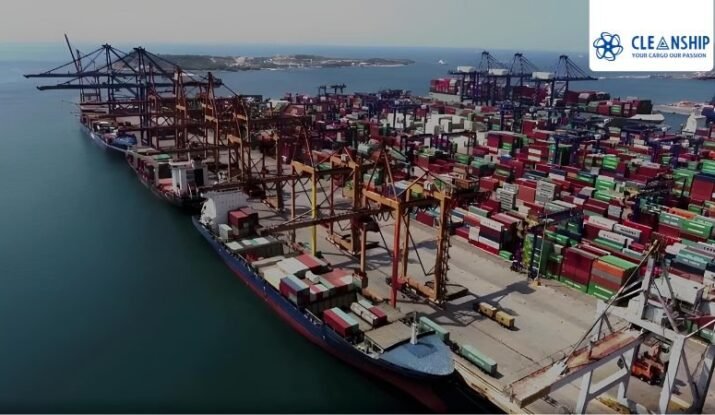As one of the busiest ports in Europe, Piraeus Port is a critical hub for cargo ships and maritime trade. An essential component of maintaining the operational efficiency and safety of ships passing through this port is ensuring their cargo holds are properly cleaned.
Hold cleaning service in Piraeus Port provide vital services that protect cargo quality, prevent contamination, and comply with international shipping standards. We’ll explore the importance of tank hold cleaning service in Piraeus port, the process involved, and the types of hold cleaning techniques commonly used.
Why Hold Cleaning is Essential for Cargo Vessels
Cargo tank hold cleaning is a mandatory practice in maritime shipping, particularly when switching from one type of cargo to another. Dirty holds can compromise the quality of the next cargo shipment, cause cross-contamination, and even lead to regulatory issues.
In Piraeus Port, bulk carrier hold cleaning services are carried out by specialized teams equipped with advanced tools and cleaning agents, ensuring ships meet all cleanliness and safety standards before loading new cargo.
Hold cleaning ensures that:
1. Cargo Quality is Maintained: Residue from previous cargo, dust, and moisture can affect the quality of the new cargo. Clean holds help preserve cargo integrity.
2. Prevention of Contamination: Certain cargoes, such as food-grade products, are highly sensitive to contamination, making it necessary to have clean holds.
3. Compliance with Regulations: Regulatory bodies, including the International Maritime Organization (IMO), have strict guidelines on cargo hold cleanliness to prevent environmental damage and safety hazards.
4. Safety and Efficiency: Clean holds reduce the risk of accidents and fires caused by dust or residue build-up.
Hold Cleaning Process in Piraeus Port
Piraeus Port provides a strategic location for hold cleaning, with access to various hold cleaning companies and specialized services. Here’s a step-by-step breakdown of the cleaning process typically followed by companies in Piraeus:
1. Inspection of Cargo Hold: The cleaning process begins with an inspection to assess the level of cleaning required. Factors like the type of previous cargo, level of residue, and condition of the hold surfaces are examined.
2. Selection of Cleaning Method: Based on the inspection, the cleaning crew selects the most appropriate method. Common methods include manual sweeping, high-pressure washing, and chemical cleaning.
3. Surface Preparation: Loose residues are removed, and the surface is prepared for deep cleaning. Any fixtures, equipment, or structural parts of the hold are cleaned separately.
4. Primary Cleaning: High-pressure water jets or other mechanical means are used to remove remaining residues. Some holds may require chemical treatments if residues are sticky or difficult to remove with water alone.
5. Rinsing and Drying: Once the primary cleaning is complete, the hold is thoroughly rinsed to remove any remaining cleaning agents and residues. After rinsing, drying is essential to prevent moisture retention, which could lead to corrosion or mold growth.
6. Final Inspection: After the cleaning and drying, a final inspection is carried out to ensure that the hold meets cleanliness standards. Only after this clearance can the vessel proceed to load the next cargo.
Types of Hold Cleaning Techniques
There are several hold cleaning techniques, each suited for different types of cargo residue and hold conditions. Here are some of the main methods used in Piraeus:
1. High-Pressure Washing: This is one of the most common methods, where high-pressure water jets are used to remove dust, residues, and stains. It is effective for cleaning grain residues, dust, and other loose materials.
2. Chemical Cleaning: For sticky or hard-to-remove residues, chemical agents may be used. Chemical cleaning agents are carefully chosen based on the type of residue to ensure they are safe for the environment and the vessel’s structure.
3. Sweeping and Brushing: Manual sweeping or brushing may be done for fine dust and residue that water jets cannot remove. This method is typically used as a preparatory step before high-pressure washing or chemical cleaning.
4. Spot Cleaning: Some areas may require targeted cleaning, especially if there is a buildup of rust or chemical deposits. Spot cleaning uses specialized equipment to remove specific contaminants.
5. Blasting (if required): For holds with stubborn stains, dry ice or grit blasting may be used. This is a more intensive process, often used on older vessels or holds with extensive rusting or encrusted residue.
Read also: Hold Cleaning Service in Dubai
Environmental Considerations in Hold Cleaning
Environmental protection is a significant concern in Piraeus Port, as it’s located near urban centers and the Aegean Sea’s ecologically rich waters. Hold cleaning companies in Piraeus use eco-friendly cleaning agents, avoid harmful chemicals, and implement waste disposal practices to prevent environmental pollution. Wastewater from cleaning processes is managed to prevent contamination of the port’s marine environment, which is in line with IMO guidelines and local regulations.
Benefits of Choosing Professional Hold Cleaning Service in Piraeus Port
Engaging professional hold cleaning service in Piraeus has multiple benefits:
1. Expertise and Equipment: Professional cleaning companies use advanced equipment and experienced staff, ensuring the job is done efficiently and to high standards.
2. Time Efficiency: Port operations are time-sensitive. Professional cleaners ensure that the hold cleaning is completed promptly, allowing ships to stay on schedule.
3. Regulatory Compliance: By adhering to international regulations and guidelines, these services help vessels avoid fines and delays due to non-compliance.
4. Cost Savings: Proper cleaning prevents future damage to the holds, reducing repair and maintenance costs in the long run.
In conclusion, hold cleaning service in Piraeus Port play a important role in supporting efficient, safe, and compliant cargo shipping. By maintaining clean holds, these services uphold the port’s reputation as a reliable maritime hub while ensuring cargo safety and quality.
FAQs
1. What are the typical costs of hold cleaning service in Piraeus Port?
2. How long does it take to clean a cargo hold?
3. Are there any environmental regulations that hold cleaning services must follow in Piraeus?
4. Is hold cleaning mandatory for all cargo types?
5. What happens if a hold is not cleaned properly?

